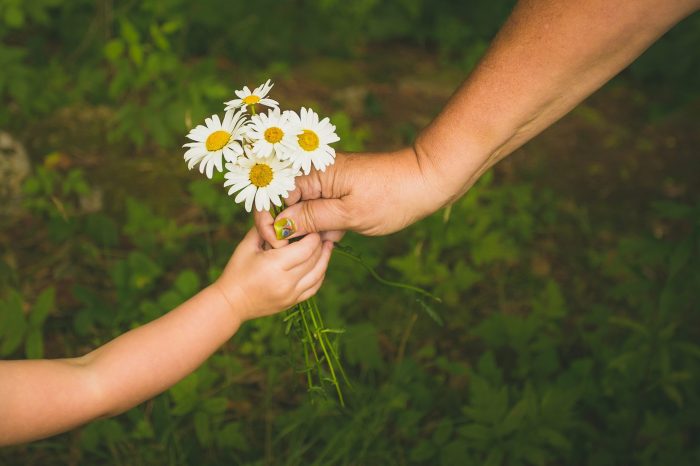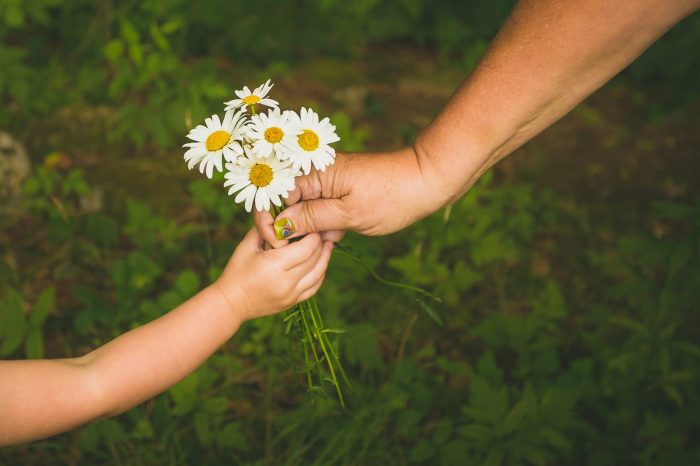
Fifty Cents Worth of Kindness: Making a Difference with Small Gestures
Fifty Cents Worth of Kindness: We all know the saying “small acts of kindness can go a long way,” but have you ever stopped to think about how much a simple gesture, even something as small as fifty cents, can impact someone’s day?
It’s amazing how a kind word, a helping hand, or even a small act of generosity can brighten someone’s spirits and create a ripple effect of positivity.
From offering a helping hand to a stranger struggling with groceries to simply smiling at someone who looks down, we can all contribute to a kinder world. It’s about recognizing the power of small acts and understanding how they can create a chain reaction of compassion and goodwill.
The Power of Small Acts
Imagine a world where every interaction, no matter how brief, leaves a positive ripple effect. This is the essence of “fifty cents worth of kindness,” where small acts of compassion can have a profound impact on someone’s day. The power of small acts lies in their ability to brighten someone’s mood, foster connection, and create a more positive environment.
Examples of Fifty Cents Worth of Kindness
Small acts of kindness don’t require grand gestures or extraordinary effort. Even the simplest gestures can make a difference. Here are a few examples:
- Holding a door open for someone.
- Offering a genuine compliment.
- Giving a helping hand to someone struggling with a task.
- Leaving a kind note for a coworker or friend.
- Donating to a local charity.
- Picking up litter in your neighborhood.
These small gestures may seem insignificant, but they can have a powerful impact on the recipient. A simple smile or a kind word can lift someone’s spirits and make them feel appreciated.
The Impact of Small Acts
Small acts of kindness have been shown to have a positive impact on both the giver and the receiver. Research suggests that performing acts of kindness can boost our own happiness and well-being.
“Acts of kindness can have a ripple effect, spreading positivity throughout a community.”
For example, a study published in the Journal of Personality and Social Psychology found that people who performed acts of kindness reported feeling happier and more satisfied with their lives.
Personal Anecdotes
I have personally witnessed the power of small acts of kindness in my own life. Once, while walking home from work, I saw an elderly woman struggling to carry her groceries. I offered to help her carry them to her car, and she was so grateful.
She told me that it was the kindest thing anyone had done for her that day. That small act of kindness made a big difference in her day and made me feel good about myself.Another time, I was feeling down about a difficult situation at work.
A coworker noticed my mood and came over to talk to me. She simply listened to me and offered words of encouragement. Her kindness helped me to feel less alone and gave me the strength to face the challenges ahead.
Sometimes, the smallest acts of kindness can make the biggest difference. A simple smile, a helping hand, or even borrowing your man’s stylish sunglasses to complete your outfit can brighten someone’s day. Speaking of borrowing, have you ever thought about using your man’s accessories to elevate your own style?
It’s a fun way to mix things up and show a little love for your partner. After all, kindness, like a good accessory, can add a touch of flair to any situation.
These are just a few examples of how small acts of kindness can have a significant impact on someone’s life. By taking the time to perform small acts of kindness, we can create a more positive and compassionate world.
Kindness in Everyday Interactions

Kindness is not just about grand gestures; it’s about the small, everyday acts that can brighten someone’s day and make the world a more positive place. These acts of kindness can be woven into our daily routines, making a difference in the lives of those around us.
Incorporating Kindness into Everyday Interactions
Kindness can be incorporated into our interactions with strangers, colleagues, and family members. It can be as simple as a smile, a kind word, or a helping hand. These small acts can have a profound impact on others, fostering a sense of connection and well-being.
Examples of Kindness in Different Scenarios, Fifty cents worth of kindness
The following table provides examples of how kindness can be expressed in various situations:| Scenario | Example of Kindness ||—|—|| Interacting with a stranger | Holding the door open for someone, offering directions, complimenting someone’s outfit || Working with colleagues | Helping a colleague with a task, offering encouragement, celebrating their achievements || Spending time with family | Listening attentively to family members, expressing gratitude, offering help with chores |
Sometimes, the smallest acts of kindness can have the biggest impact. A simple “hello” or a helping hand can make someone’s day. It reminds me of that old saying, “a penny for your thoughts.” But what if we flipped the script and asked, “Can you spot the difference” can you spot the difference between a kind gesture and a simple act of politeness?
It’s a subtle difference, but one that can truly brighten someone’s day. And you never know, that fifty cents worth of kindness might just ripple outwards, touching more lives than you could ever imagine.
Ways to Show Kindness in Daily Routines
Kindness can be integrated into our daily routines, making a difference in the lives of those around us. Here are some examples:* Grocery Shopping:Offer to help someone carry their groceries, let someone go ahead of you in line if they have only a few items.
Commuting
Give up your seat on public transportation to someone who needs it, offer to help someone with their luggage.
Using Public Services
Be patient and polite when dealing with customer service representatives, offer a kind word to those who are working hard to serve others.
The Ripple Effect of Kindness: Fifty Cents Worth Of Kindness
Kindness, like a pebble dropped into a still pond, creates ripples that extend far beyond the initial act. It has the remarkable ability to inspire others, setting off a chain reaction of positive actions that can transform communities and even the world.
The Power of Inspiration
One act of kindness can ignite a spark of inspiration in others, motivating them to pay it forward. When we witness someone being kind, it often triggers a sense of empathy and a desire to reciprocate that generosity. This can lead to a snowball effect, with each act of kindness inspiring more kindness in its wake.
Real-World Examples of the Ripple Effect
- The “Pay it Forward” movement, which encourages people to perform acts of kindness for others, has gained immense popularity worldwide. A simple act like buying coffee for the person behind you in line can inspire others to do the same, creating a ripple effect of generosity throughout the day.
- The story of the “Kindness Rocks” movement is a testament to the power of small acts of kindness. People paint rocks with inspirational messages and hide them in public places for others to find. These rocks have spread across the globe, bringing joy and hope to countless individuals.
Sometimes, the smallest gestures can have the biggest impact. A simple “hello” to a stranger, holding the door for someone, or offering a helping hand can make a world of difference. These acts of kindness, even if they only cost fifty cents worth of effort, can brighten someone’s day and make the world a little bit brighter.
As we embark on a new year, let’s all strive to make it a happy healthy new year filled with kindness and compassion. By spreading positivity, we can create a ripple effect that inspires others to do the same, making the world a more beautiful and caring place, one fifty cents worth of kindness at a time.
- A study by the University of California, Berkeley, found that people who perform acts of kindness experience a boost in their own happiness and well-being. This positive feeling can then lead them to be more kind to others, creating a cycle of kindness and happiness.
Visualizing the Ripple Effect
Imagine a large pond with a single pebble dropped into its center. The impact of the pebble creates concentric circles that expand outward, gradually diminishing in size. These circles represent the ripple effect of kindness. The initial act of kindness is the pebble, and the expanding circles represent the impact it has on those around it.
As the circles reach others, they inspire them to perform their own acts of kindness, creating new ripples that spread even further.
The Benefits of Kindness
Kindness, a simple yet profound act, offers a wealth of benefits, impacting both the giver and receiver in ways that extend beyond mere surface interactions. It cultivates a positive ripple effect, fostering personal growth, strengthening relationships, and ultimately contributing to a more harmonious society.
Psychological Benefits of Giving Kindness
Giving kindness has a profound impact on our psychological well-being. It triggers the release of endorphins, the body’s natural mood boosters, creating a sense of happiness and satisfaction. This positive feedback loop reinforces the act of kindness, making us more likely to repeat it.
Research suggests that engaging in acts of kindness can:
- Reduce stress and anxiety: Kindness can act as a buffer against the negative effects of stress, promoting relaxation and reducing feelings of anxiety. This is due to the release of oxytocin, a hormone associated with bonding and trust, which has calming effects.
- Boost self-esteem and confidence: Performing acts of kindness can increase our sense of self-worth and confidence. Knowing that we are making a positive difference in the lives of others can boost our self-esteem and make us feel more connected to our community.
- Increase feelings of happiness and well-being: Giving kindness has been shown to increase levels of happiness and well-being. By focusing on the needs of others, we shift our attention away from our own problems and worries, leading to a more positive outlook.
Social Benefits of Giving Kindness
Kindness is a powerful tool for building strong social connections and fostering a sense of community. When we extend kindness to others, we create a positive feedback loop that encourages others to reciprocate, strengthening social bonds and fostering a more supportive environment.
This can lead to:
- Stronger relationships: Acts of kindness, such as offering a helping hand or expressing gratitude, can strengthen relationships with friends, family, and colleagues. These gestures demonstrate care and support, fostering trust and intimacy.
- Increased social support: A community where kindness is valued is more likely to provide social support to its members. This support can be crucial during times of stress or difficulty, helping individuals cope with challenges and maintain their well-being.
- Greater sense of belonging: When we engage in acts of kindness, we contribute to a positive and supportive environment. This can lead to a greater sense of belonging and connection to our community, fostering a sense of shared purpose and responsibility.
Psychological Benefits of Receiving Kindness
Receiving kindness can be just as beneficial as giving it. It can:
- Reduce stress and anxiety: Being the recipient of kindness can trigger the release of oxytocin, promoting feelings of calmness and reducing stress levels. This can be especially helpful during times of difficulty or hardship.
- Boost mood and happiness: Acts of kindness can brighten our day and lift our spirits, reminding us that we are valued and cared for. This can lead to a more positive outlook and increased feelings of happiness and well-being.
- Increase feelings of connection and belonging: Receiving kindness from others can strengthen our sense of belonging and connection to our community. It reminds us that we are part of a network of support and that we are not alone.
Social Benefits of Receiving Kindness
Receiving kindness can have a positive impact on our social interactions and relationships. It can:
- Improve communication and understanding: When we receive kindness from others, it can help us feel more understood and valued. This can lead to improved communication and stronger relationships.
- Promote empathy and compassion: Being on the receiving end of kindness can inspire us to be more empathetic and compassionate towards others. We may be more likely to offer kindness to others if we have experienced its benefits firsthand.
- Create a more positive and supportive community: When we receive kindness, it can create a ripple effect, inspiring us to pay it forward. This can lead to a more positive and supportive community where kindness is valued and practiced.
Comparing the Benefits of Giving and Receiving Kindness
While both giving and receiving kindness offer significant benefits, they each have unique aspects:
- Giving kindness: Focuses on the act of extending generosity and support to others, leading to feelings of satisfaction, increased self-esteem, and a stronger sense of purpose. It often involves a conscious effort to make a positive difference in the lives of others.
- Receiving kindness: Focuses on the experience of being supported and cared for, leading to feelings of gratitude, reduced stress, and increased happiness. It often involves a sense of being valued and appreciated, reminding us that we are not alone.
Cultivating Kindness
Kindness is not an innate trait but a skill that can be cultivated through conscious effort. By practicing mindfulness, gratitude, and empathy, we can develop a more compassionate and kind mindset. These practices can transform our daily interactions and create a ripple effect of positivity in our communities.
Mindfulness and Kindness
Mindfulness is the practice of paying attention to the present moment without judgment. It involves being aware of our thoughts, feelings, and sensations without getting carried away by them. When we practice mindfulness, we become more attuned to the needs and experiences of others, fostering empathy and compassion.
- Meditation:Regular meditation can help us cultivate mindfulness by training our minds to focus on the present moment. There are numerous guided meditation apps and online resources available to assist beginners.
- Mindful Breathing:Taking a few deep breaths throughout the day can help us stay grounded and present. This simple practice can be particularly helpful when feeling stressed or overwhelmed.
- Mindful Walking:Paying attention to the sensations of our feet on the ground and the surrounding environment as we walk can help us connect with the present moment.
Gratitude and Kindness
Gratitude is a powerful emotion that can shift our focus from what we lack to what we have. When we cultivate gratitude, we appreciate the good things in our lives, fostering a more positive and compassionate outlook.
- Gratitude Journal:Writing down things we are grateful for each day can help us develop a more positive mindset.
- Gratitude Meditation:Guided meditations that focus on gratitude can help us cultivate this emotion and appreciate the good things in our lives.
- Expressing Gratitude:Taking the time to express gratitude to others, whether through words or actions, can strengthen our relationships and spread positivity.
Empathy and Kindness
Empathy is the ability to understand and share the feelings of another person. When we cultivate empathy, we can connect with others on a deeper level, fostering compassion and kindness.
- Active Listening:Paying attention to what others are saying, both verbally and nonverbally, can help us understand their perspectives and connect with their emotions.
- Perspective Taking:Trying to see things from another person’s point of view can help us understand their experiences and motivations.
- Empathy Exercises:There are various exercises and activities that can help us develop our empathy skills. For example, role-playing scenarios from different perspectives can enhance our understanding of others.
Resources for Cultivating Kindness
There are numerous resources available to help individuals cultivate a more compassionate and kind mindset.
- Books:“The Book of Joy” by the Dalai Lama and Desmond Tutu, “Kindness” by Adam Phillips, and “The Power of Kindness” by Diana Chapman.
- Online Courses:Coursera, edX, and Udemy offer courses on mindfulness, gratitude, and empathy.
- Apps:Headspace, Calm, and Insight Timer provide guided meditations and mindfulness exercises.






